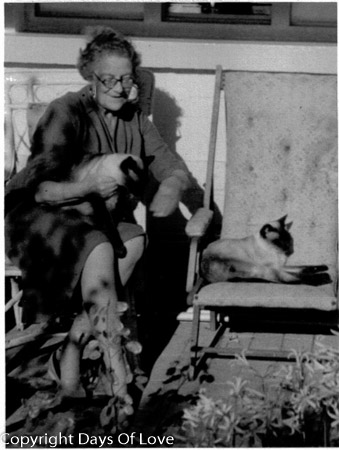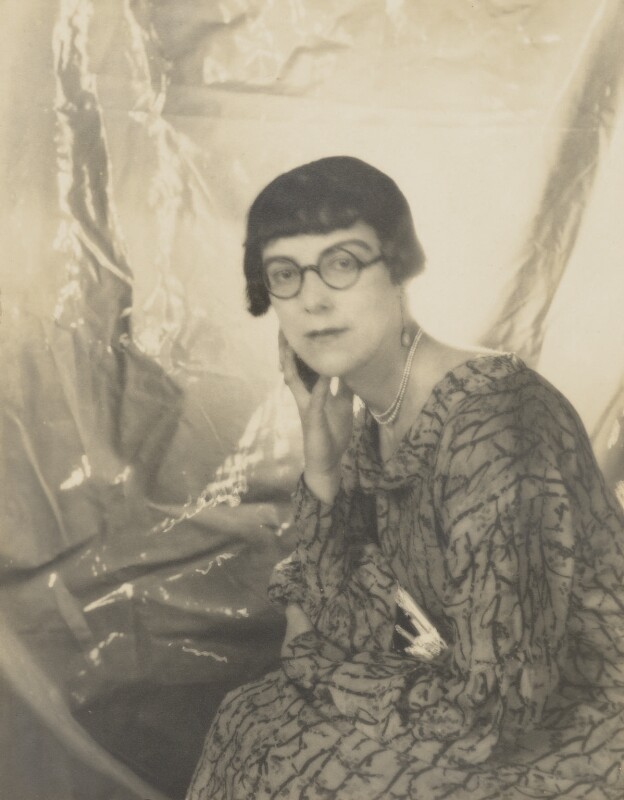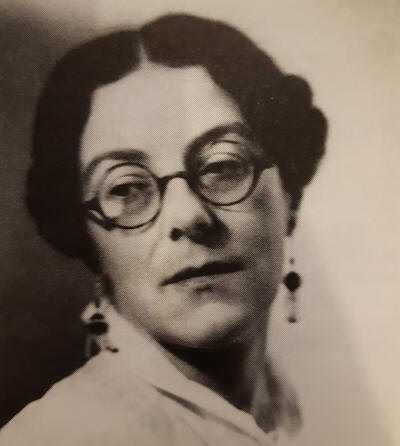

Partner Valentine Ackland, buried together
Queer Places:
Harrow School, 5 High St, Harrow, Harrow on the Hill HA1 3HP, UK
127
Queensway, London W2 4SJ, UK
121 Inverness Terrace, London W2 6JF, UK
113 Inverness Terrace, London W2 6JH, UK
Miss Green's Cottage, Chaldon Herring, Dorchester DT2 8DN, UK
Frankfort Manor, Sloley, Norwich NR12 8HA, UK
The Hut Dairy, Chydyok Rd, Chaldon Herring, Dorchester DT2 8DL, UK
Riverside Cottage, Dorchester DT2 0DX, UK
Salthouse, Holt NR25 7XG, UK
St Nicholas, Chaldon Herring, Dorchester DT2 8DN, UK
 Sylvia
Townsend Warner (6 December 1893 – 1 May 1978) was an English novelist and
poet. She also made a contribution to musicology as a young woman. She
wrote "Whether a Dove or a Seagull" with lifelong companion Valentina
Ackland. Ackland 135 page long love letter to Sylvia was published in 1985
as "For Sylvia".
Sylvia
Townsend Warner (6 December 1893 – 1 May 1978) was an English novelist and
poet. She also made a contribution to musicology as a young woman. She
wrote "Whether a Dove or a Seagull" with lifelong companion Valentina
Ackland. Ackland 135 page long love letter to Sylvia was published in 1985
as "For Sylvia".
Sylvia Nora Townsend Warner was born at Harrow on the Hill, Middlesex, the only child of George Townsend Warner[1] and his wife Eleanor "Nora" Mary (née Hudleston).[2][3] Her father was a house-master at Harrow School and was, for many years, associated with the prestigious Harrow History Prize which was renamed the Townsend Warner History Prize in his honour, after his death in 1916. As a child, Townsend Warner was home-schooled by her father. She enjoyed a seemingly idyllic childhood in rural Devonshire, but was strongly affected by her father's death. She moved to London and worked in a munitions factory at the outbreak of World War I.[4]
Warner was friendly with a number of the "Bright young things" of the 1920s. Her first major success was the novel Lolly Willowes. In 1923, she met T. F. Powys, whose writing influenced her own and whose work she in turn encouraged. It was at Powys' home that Warner, in 1930, first met Valentine Ackland, a young poet; the two women fell in love and settled at Frome Vauchurch, Dorset.[4] Alarmed by the growing threat of fascism, they were active in the Communist Party, and in 1937 visited Valencia and Benicàssim,[5] in Spain, on behalf of the Red Cross during the Civil War.[2] They lived together from 1930 until Ackland's death in 1969. Ackland and Warner are buried together at St Nicholas, Chaldon Herring, Dorset.[6]
Early in her career Warner researched 15th and 16th century music. From 1917 she was in regular employment as one of the editors of Tudor Church Music,[7] ten volumes published by Oxford University Press in the 1920s with the support of the Carnegie UK Trust.[8] She obtained the work through the influence of her lover and music teacher Sir Percy Buck, who was on the editorial committee.[9] The lead editor was initially Sir Richard Terry, who as the Master of Music at Westminster Cathedral, had been a pioneer in the revival of Tudor vocal repertoire.

by Cecil Beaton, 1930

Howard Coster (British, 1885-1959)
Sylvia Townsend Warner
1934
Half-plate film negative
Transferred from Central Office of Information, 1974
© National Portrait Gallery, London

Warner was involved in travelling to study source material and in transcribing the music into modern musical notation. Warner also published on the subject of musical notation including a contribution to the Oxford History of Music (in the introductory volume of 1929).[10]
One of the most extraordinary spinsters to come out of the 1920s is Sylvia Townsend Warner’s Lolly Willowes (1926). Laura – Lolly – starts out as a classic aunt, sallow, plain and pointy-faced. Aged twenty-eight when the novel starts, she is starting to look perilously unmarriageable. Lolly, who lives according to the Victorian model under her brother Henry’s roof in London, along with her conventional sister-in-law Caroline and their children, seems to be an unobtrusive member of the family. It is true she is rather erudite and has shown an early interest in herbalism, but she does her fancy needlework conscientiously. However, she is also given to making unexpected pronouncements. The one and only suitor to come calling is rapidly deterred by Lolly’s blithe hint that he may, entirely without knowing it, be a werewolf. ‘This settled it. Henry and Caroline made no more attempts to marry off Laura.’ Lolly’s perceived eccentricities gradually accumulate. She roams London secretly haunting second-hand bookshops and furtively feasting off marrons glacés. One late afternoon she strays into a greengrocer’s shop in Moscow Road, where she purchases a bunch of russet-coloured chrysanthemums. The flowers come with a generous spray of beech fronds: They smelt of woods, of dark rustling woods like the wood to whose edge she came so often in the country of her autumn imagination. She stood very still to make quite sure of her sensations. Then: ‘Where do they come from?’ she asked. Buckinghamshire, comes the answer. Lolly moves out. Deaf to her family’s indignant protests, she takes a cottage in the remote and secluded village of Great Mop, in the heart of the Buckinghamshire Chilterns. Gradually she learns her new landscape by heart; it is full of cooing pigeons and rustling beechwoods, and the nights are lovely and serene. Every evening after supper she chats with her friendly landlady over a glass of home-made dandelion and mangold wine. In the village the neighbours are unconcerned by her ways, for theirs are just as odd: the clergyman keeps a tame owl, Misses Minnie and Jane Larpent cook stewed rabbit for the Bishop, Mr Gurdon the parish clerk has a curly red beard and bullies the choirboys. Slowly, Lolly takes on the life of this curious village, and then one day a small kitten comes into her room. Surprised by the uninvited guest, Lolly bends to stroke it; it bites and claws her ferociously, streaking her hand with red scratches. And now she knows for certain what she has always guessed: She, Laura Willowes, in England, in the year 1922, had entered into a compact with the Devil. The compact was made, and affirmed, and sealed with the round red seal of her blood. Laura is a witch. She joins the Great Mop coven. Unerringly, her Master has led her to his place. She has come home. And finally, in a graveyard, she meets him. Lolly’s evolution is complete, and yet she is what she always was: adventurous, independent, odd and unsafe. Sylvia Townsend Warner – herself unmarried – challenged propriety in her own life. She loved women, not men. Her impatience with the conventions that governed single women’s lives takes form in Lolly Willowes, a triumphant vindication of the spinster. Lolly refuses to be patronised, to be ‘Poor Lolly’ or ‘Dear Lolly’. She will not submit to being the kind of maiden aunt who gets given hot water bottles for birthdays. What does she care if men disdain her body as unattractive, when the Devil himself has sought out her soul? Satan offers secrecy, charm, danger, and immunity from judgement: That’s why we become witches: to show our scorn of pretending that life’s a safe business, to satisfy our passion for adventure… One doesn’t become a witch to run round being harmful, or to run round being helpful either, a district visitor on a broomstick. It’s to escape all that – to have a life of one’s own, not an existence doled out to you by others… Lolly Willowes is witty, lyrical and affirmative, not agitprop in the war of the sexes, but a profound cri de cœur: ‘Leave me alone, and let me be what I am.’
In 1934 she published a joint collection of poems with Ackland, Whether a Dove or a Seagull. She was encouraged to write fiction by David Garnett.[11] Warner's novels included Lolly Willowes (1926), Mr Fortune's Maggot (1927), Summer Will Show (1936), and The Corner That Held Them (1948).[12] Recurring themes are evident in a number of her works. These include a rejection of Christianity (in Mr Fortune's Maggot, and in Lolly Willowes, where the protagonist becomes a witch); the position of women in patriarchal societies (Lolly Willowes, Summer Will Show, The Corner that Held Them); ambiguous sexuality, or bisexuality (Lolly Willowes, Mr Fortune's Maggot, Summer Will Show); and lyrical descriptions of landscape. Mr Fortune's Maggot, about a missionary in the Pacific Islands, has been described as a "satirical, anti-imperialist novel".[13] In Summer Will Show, the heroine, Sophia Willoughby, travels to Paris during the 1848 Revolution and falls in love with a woman.[2]
Warner's short stories include the collections A Moral Ending and Other Stories, The Salutation, More Joy in Heaven, The Cat's Cradle Book, A Garland of Straw, The Museum of Cheats. Winter in the Air, A Spirit Rises, A Stranger with a Bag, The Innocent and the Guilty, and One Thing Leading to Another. Her final work was a series of linked short stories set in the supernatural Kingdoms of Elfin.[12] Many of these stories were published in The New Yorker.[4] In addition to fiction, Warner wrote anti-fascist articles for such leftist publications as Time and Tide and Left Review.[11]
After the death of the novelist T. H. White, Warner was given access to his papers. She published a biography which The New York Times declared "a small masterpiece which may well be read long after the writings of its subject have been forgotten."[14] White's long-time friend and literary agent, David Higham, however, questioned Warner's work, suggesting a bias in her approach due to her own homosexuality: he gave Warner the address of one of White's lovers "so that she could get in touch with someone so important in Tim's story. But she never, the girl told me, took that step. So she was able to present Tim in such a light that a reviewer could call him a raging homosexual. Perhaps a heterosexual affair would have made her blush."[15]
Warner produced several books of poetry, including Opus 7, a book-length pastoral poem about an elderly female flower-seller.[2]
Although Warner never wrote an autobiography, Scenes of Childhood was compiled after her death on 1 May 1978 at age 84, based on short reminiscences published over the years in the New Yorker. She also translated Contre Sainte-Beuve by Marcel Proust from the original French into English.[2] In the 1970s, she became known as a significant writer of feminist or lesbian sentiment,[2] and her novels were among the earlier ones to be revived by Virago Press. Selected letters of Warner and Valentine Ackland have been published twice: Wendy Mulford edited a collection titled This Narrow Place in 1988, and ten years later Susanna Pinney published another selection, Jealousy in Connecticut.
My published books: